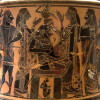
Esoteric teachings of Golden Citizens of Ancient Greece
Spiritual Wisdom of Pythagoras, Socrates, Plato and Aristotle introducing Democracy within Greek City States 400 BC Art, Education, Spirituality, Power of MindAncient Greek Philosophers 400 BC – 200 AC
Closer to Truth closer to Gods and their wisdom

Treading the path of the development of Human Thought, giving full respect to Mother Philosophy and acknowledging how difficult it is to implement any noble idea in the world where Peace as humanity highest potential is still waiting, we cannot but stay in owe of Greek leaders like , or who in their Search of the Highest, were introducing democracy within their city states 100s of years before Christ.
In search of perfection, veneering many centuries of struggle for equality, researching consciousness, and the arena of alchemy of human society, todaz we give our respect towards some of the most amazing social experiments and their implementation by exceptional minds and souls born around the Mediterranean, more than 2,000 years ago.
art and Esoteric teachings of Greek Golden Citizens: Pythagoras, Socrates, Plato and Aristotle
Eutopia as Perfect Society and Democracy of Greek City States 400 BC
Eutopia, derived from Greek εὖ ("well") and τόπος ("place"), means "a place of wellness", describes a community or society that possesses perfect qualities, with a perfect social system in place, having no inherent built-in inequalities. Plato in his Republic suggests a place where this perfect society will flourish. The golden citizens of this place are trained in a rigorous 50 years long educational program to become philosopher kings. The wisdom of these rulers is mainly used to eliminate poverty through the distribution of agricultural resources to the citizens. It has few laws, no citizens sent to war, and it focuses on equality in economics, government and justice.
The classical period also brought with it a political reform known as demokratia, or “rule by the people.”
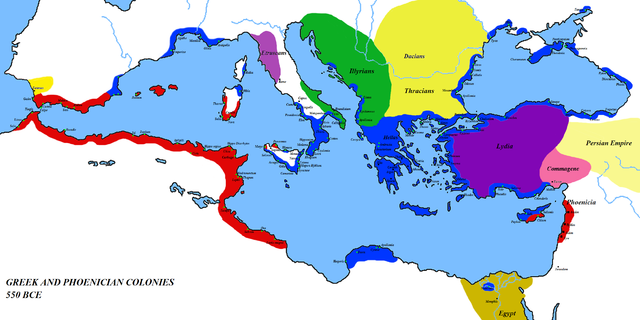
The Mediterranean in 600 BC Phoenician settlements are labelled in red Greek areas in blue
Ancient Greece, between 800 BC and 100 AC saw most amazing advances in art, philosophy and science, and it was the age of city-states or polis that had own Local Governments, free of Global Taxes, protected by own Gods, for hundreds of years.
This was the time when science and religion were not separate and getting closer to the Truth (In Search of Truth) meant getting closer to the Gods. Classical Greece is considered to be the seminal culture or the cradle of Western civilization.
In the 8th century BC, the Greeks adopted the Phoenician alphabet, modifying it to create the Greek alphabet, the earliest evidence is on the Greek pottery from the mid-8th century.
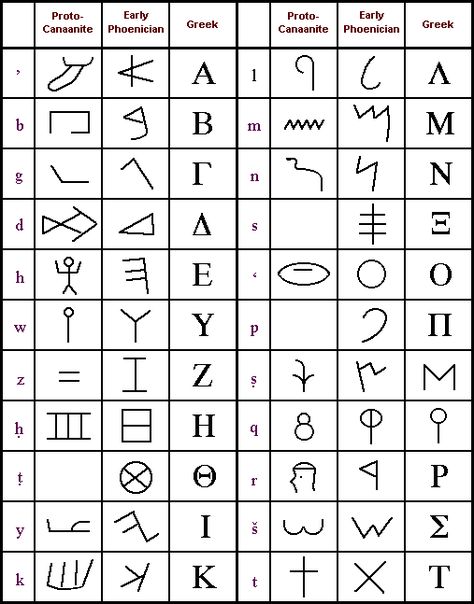
Canannite languages Greek alphabet charts
Just to give you an idea of how advanced this civilization was, Herodotus, called by Cicero (100 BC) a Roman writer, "The Father of History", was an ancient Greek historian who has written The Histories, using systematic investigation to explore the origins of the Greco-Persian Wars. Written around 450 BC, Herodotus' work discusses 600 BC historical figures. Pythagoras and his students Plato, and Aristotle, both coming from Athens, understood the importance of symbols, numbers, or mathematics as instruments of Universal Truth that offer divine knowledge following the main Macro manifesting within Micro principle. Pheidon of Argos established a system of weights and measures, Theagenes of Megara brought running water to the city. Homer produced his Iliad and Odyssey, found later in the rich Egyptians Mummy burial cases, together with the Bible, sculptors created statues as memorials to the dead, Anaximandros devised a theory of gravity; Xenophanes wrote about his discovery of fossils; and Pythagoras discovered his Pythagoras theorem.
As farming villages grew larger, they developed their own Governments and organized their inhabitants around set of laws. They all had economies that were based on agriculture. These city-states were known as poleis and were protected by own God or Goddess, Athens and Sparta were both protected by Athena. Most had overthrown their hereditary kings, or priests, and were ruled by a small number of wealthy aristocrats. Each of these poleis was an independent city-state. The new poleis were self-governing and self-sufficient. The new emerging polies were not politically controlled by their founding cities.
Read Babylon Mysticism, Amorites first fighters for Justice Freedom Equality 2000 BC
By the 6th century BC Greece had influential Governments: Athens, Sparta, Corinth, Thebes and Argos. Athens and Corinth also became major maritime powers. In this period, the advent of the democracy of Athens led to a 'golden age' for the Athenians. They spread Greek art and initiated a creative revolution.
Homer's Odyssey and Iliad
Within mummy cases of ancient Egyptian nobility dated back to 200 AC as an after-life protection for departing souls following the process of dying, we find earliest preserved papyruses of early Christian versions of Old and New Testaments, a list with Ten Commandments, and some classics from Ancient Greece, Homer’s Iliad and Odyssey and Menander’s plays, works of ancient Greek writers.
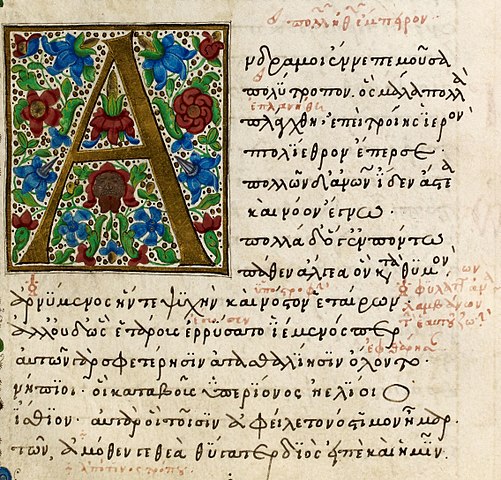
15th century manuscript of the Odyssey written for Florence family British Museum
At these days wars were constant, yet rather docile, the Odyssey and the Iliad two ancient Greek epic plays, considered the oldest work of Western literature, composed at the end of the 8th century BC, tell us about one of them. The play is about Odysseus, king of Ithaca, journeying back home after the fall of Troy. It takes the Greek hero Odysseus ten years to reach his home after the ten year Trojan War. You must have heard of the famous Trojan War waged against the city of Troy by Greeks after Paris took Helen from her husband Menelaus, king of Sparta. During his return journey, all but Odysseus were drowned. Washed ashore on the island of Calypso, he stays with her for seven years... Malta has a cave called Calypso’s cave located in Gozo next to one of the ancient Megalithic Temples. According to the story, Gods had to interfere and release Odysseus from Calypso’s hands to return him back to his wife in his home-land, in response to Athena's plea.
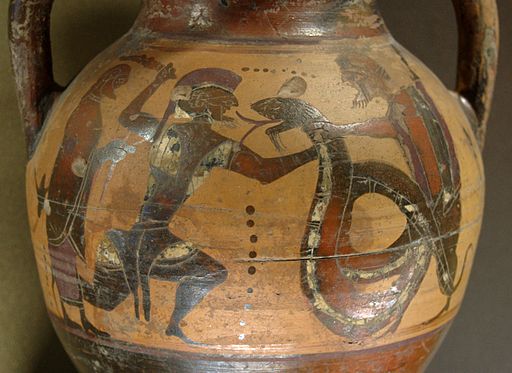
With the Rise of Macedon, led by Philip II, in his invasion of 338 BC, Philip unified the kingdom, and conquered Thessaly and Thrace. He compelled the majority of the city-states to join the League of Corinth, preventing them from warring with each other. Alexander the Great, son of Philip, enlarged the Empire. When Alexander died in 323 BC, Greek power and influence was at its zenith.
The conquests of Alexander led to a steady cultural exhange between East and West with some Greeks migrating to Egypt.
Read more in Mysticism or Magic of Greek Philosophers
The Greek poleis gained back some of their freedom, although still subject to the Macedonian Kingdom. The great centers of Hellenistic culture were Alexandria and Antioch.
The Antigonid Kingdom became involved in a war with the Roman Republic in the late 3rd century. Although the First Macedonian War was inconclusive, the Romans, continued to make war on Macedon until it was completely absorbed into the Roman Republic (by 149 BC).
In 146 BC, Romans brought an end to the independence of all of Greece.
The Greek language served as a lingua franca in the East and in Italy, and many Greek intellectuals moved to Rome. Read more about the development of the scripts in
Esoteric Mystical Knowledge Methods - Reading and Writing
Neolithic Wisdom
- Wisdom of Gods
Ancient Mediterranean Cultures and Advanced Civilizations by Nataša Pantović Nuit The Tao of Logos During the past 50 / 100 years , more and more archeological findings f - El Ra Ma
Supreme God and Sound Frequency Chanting Mantras by Nataša Pantović Nuit The philosophical research concerning the divine and consciousness poses the question: Is there a - The Tao of Logos
by Nataša Pantović Nuit Have you seen the oldest preserved Gospel of John found in Egypt 200 AC? It took me ages but I did go line by line comparing the old Greek text to - Metaphysics of sound
True Name of god and Ancient symbols and frequencies by Nataša Pantović Pulsation, vibration, rhythm exists everywhere as Akasha / Sound / Waves and we hope to reach th






Esoteric teachings of Golden Citizens of Ancient Greece No comments on Esoteric teachings of Golden Citizens of Ancient Greece: